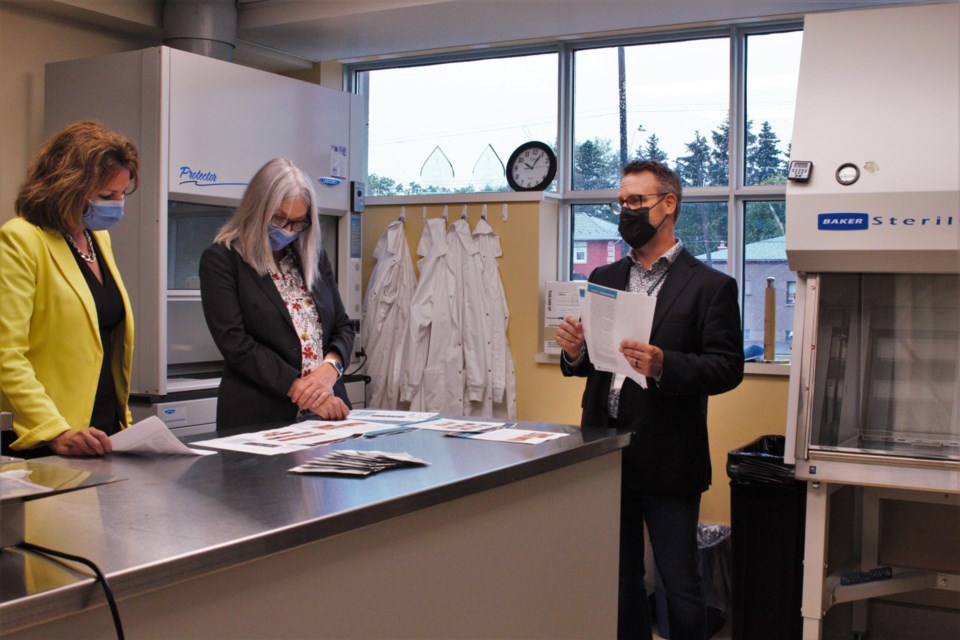THUNDER BAY – A FedNor investment of just over $2. 3 million will help two major players in the region’s health research sector expand their efforts. The federal agency announced over $1.
9 million in funding for the Thunder Bay Regional Health Sciences Centre, and over $400,000 for tissue bank RegenMed at the local non-profit’s Munro Street facility on Tuesday. RegenMed will use the funds to continue developing DermGen, a product meant to help those with chronic, difficult-to-heal wounds. The process takes human skin from medical donors and removes cellular components to create a clean “dermal matrix” that won’t be rejected by a patient.
It’s then placed on wounds to create a type of biological scaffold, which can accelerate healing. RegenMed’s executive director, David Stezenko, said the treatment could be life-changing for those suffering from diabetic foot ulcers, a “horrible problem” faced by several thousand patients a year in Ontario. Using Canada’s current standard of care, only around 30 per cent of those difficult-to-heal wounds end up being healed, he said, and too many lead to below-the-knee amputation.
Early case studies are showing “phenomenal results,” said Stezenko – of 49 patients treated so far, 83 per cent had full closure of their wounds within four to six weeks, he reported. Working with DeCell Technologies in Halifax, RegenMed is gearing up to hopefully expand production. Stezenko said that success will be built on word of mouth in the medical community.
“This type of product isn’t part of the standard of care for Canadian clinicians, so we need to introduce this to clinicians to show them what it can do,” he said. “It’s going to be finding the right key opinion leaders to see the results, and then we’ll develop this market across the country. ” Given promising early results, he expects to see increased uptake on DermGen within six to eight months.
RegenMed currently has 17 employees, but Stezenkio is optimistic that could soon expand. “With the growth of DermGen… there will obviously be a demand for more manufacturing, and as that comes to fruition, we’ll definitely be looking to grow our health human resources and the physical lab space, as well. ” Thunder Bay-Superior North MP Patty Hajdu, the minister responsible for FedNor, said the fact RegenMed’s products address a common health need in the region was appealing.
“The innovation RegenMed is showing around developing new products that can actually help increase people’s chances of healing, of recovery, means those people have better quality of life,” she said. Thunder Bay Regional Health Sciences Centre president Rhonda Crocker Ellacott, on hand to welcome the FedNor investment on Tuesday, agreed a product like it is badly needed. “We know diabetic wounds are an incredible challenge, and at times those wounds will never heal,” she said.
“What we’re seeing now with RegenMed in their studies, if that turns out – and it looks incredibly promising – it really could mean a change of life. ” “On any given day, there would be individuals admitted with difficult wounds” to the hospital, she said. “Unfortunately, individuals lose limbs in the Northwest more than they do in any other part of Ontario, so this is particularly important for individuals in the Far North and Northwestern Ontario.
” A substantial FedNor investment will help the TBRHSC boost its own research efforts. The hospital received $1,228,005 to expand its cyclotron technology, which makes radioactive isotopes for medical imaging and research. TBRHSC will also receive $684,110 to renovate and upgrade its medical imaging suite and purchase other equipment.
The $3. 5 million cyclotron recently began producing radioactive medical isotopes after long delays. The isotopes are used for imaging to scan cancer patients and for research purposes.
Producing isotopes in the region offers clear benefits to patients, said Crocker Ellacott, allowing for more diagnostic tests and research to be performed. “What it’s meant for patients in Northwestern Ontario is essentially instead of relying on planes delivering isotopes from other regions, we’re able to produce the radio isotopes here in Thunder Bay, and we’re no longer reliant on others, the weather, and those sorts of things. ” That’s helped avoid cancelling appointments, sometimes for patients who have travelled long distances, she said.
Before a tour of RegenMed’s facility Tuesday, Hajdu said the investments are meant to sustain a diverse economy in the region. “It’s really important from a FedNor perspective to develop this industry that’s health technology and health innovation,” she said. “Lots of people don’t know this is a feature of Northern Ontario, but it is, and it has been for a number of years.
FedNor sees this as an economic driver, and that we can attract new talent to our region. ”.

